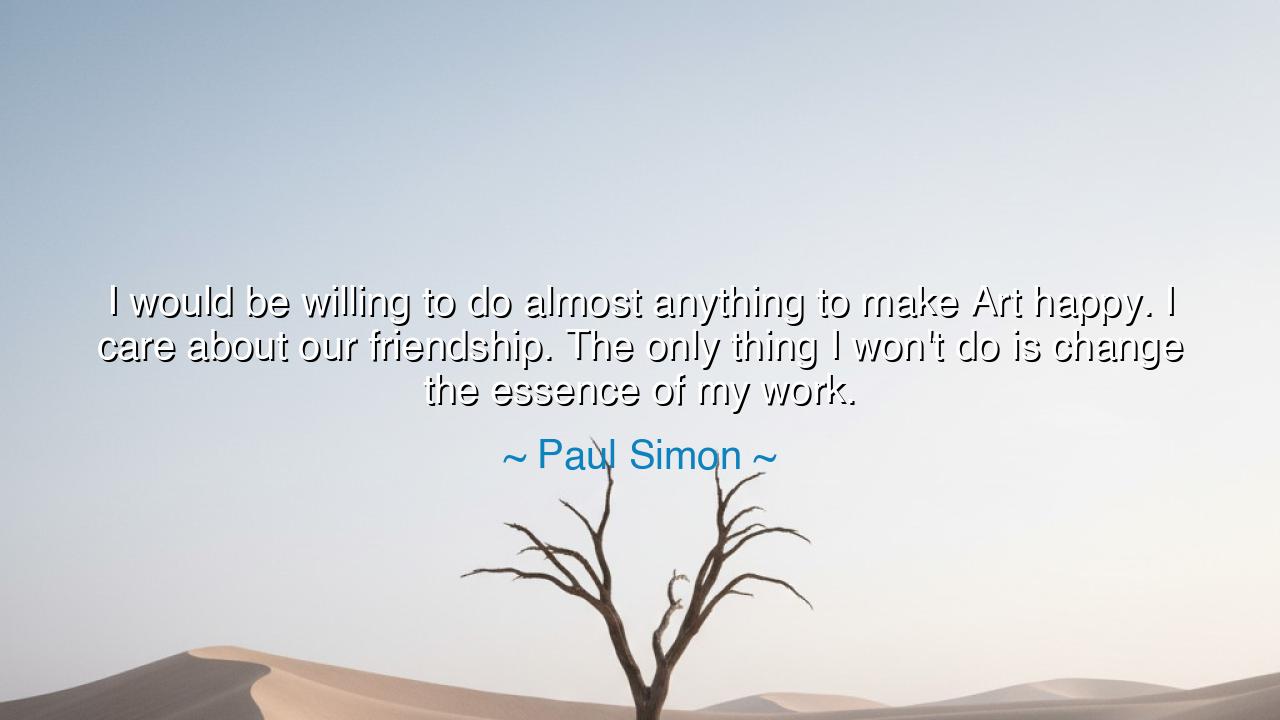
I would be willing to do almost anything to make Art happy. I
I would be willing to do almost anything to make Art happy. I care about our friendship. The only thing I won't do is change the essence of my work.






"I would be willing to do almost anything to make Art happy. I care about our friendship. The only thing I won't do is change the essence of my work." These words spoken by Paul Simon offer a powerful testament to the tension that exists between personal integrity and the deep bonds we share with others. In them, Simon speaks to the complexity of friendship and artistic expression—the struggle to remain loyal to both a loved one and the very essence of one's work. It is a delicate balance, for friendship often calls upon us to compromise, to adapt, and to put the needs of others before our own. Yet, Simon reveals a crucial truth: some things, some parts of our very soul, cannot be altered, even in the pursuit of harmony with others.
In the ancient world, the philosophers and artists were keenly aware of the tension between personal integrity and the desire for approval or acceptance from others. Socrates himself famously said that "the unexamined life is not worth living," suggesting that the pursuit of truth and personal virtue must always take precedence over the opinions of others. His own relationships, including his friendship with Plato, were rooted in a shared commitment to wisdom and truth, and while Socrates deeply valued the companionship of his disciples, he would not compromise his integrity for the sake of their approval. In the same vein, Paul Simon emphasizes that while he would go to great lengths to preserve the friendship with Art Garfunkel, he would not allow that relationship to force him to change the essence of his artistic vision.
The relationship between Achilles and Patroclus in Homer's Iliad provides another striking example of this tension. Their friendship was so strong that it transcended the boundaries of traditional friendships, and yet, even in the depths of their bond, Achilles could not be swayed from his pursuit of honor and glory. When Patroclus was slain in battle, Achilles' grief was immense, yet his commitment to his own path—his pursuit of vengeance and victory—remained unshaken. The essence of his being, his honor, was non-negotiable, and even the love for his closest friend could not alter his course. This illustrates the depth of what Simon speaks to—the way in which friendship and personal integrity are deeply intertwined, and yet sometimes, despite the strength of the bond, one must remain true to the calling of one’s own soul.
Consider the famous artist Michelangelo, whose friendship with Pope Julius II provides another example of the delicate balance between art and relationships. The Pope, eager to have Michelangelo paint the Sistine Chapel, tried to impose his own vision on the artist, pushing him to create a work that aligned with papal desires. Despite the immense pressure, Michelangelo remained steadfast in his commitment to his own vision. The conflict between the Pope’s expectations and Michelangelo’s need to preserve his artistic integrity created tension, but in the end, Michelangelo crafted a masterpiece that was his own—a work of art that was not swayed by external demands. This relationship, like the one between Simon and Garfunkel, demonstrates the importance of staying true to the very essence of one’s work while navigating the complexities of friendship and external pressure.
What Simon is truly expressing is the sacredness of authenticity—that in a world full of expectations, demands, and desires for compromise, we must hold fast to our inner truths. Friendship is a gift that requires sacrifice, but sacrifice should never require the erosion of our core identity or the compromise of our greatest purpose. There will be moments in life where friendships will demand change, or the world will encourage us to bend to the will of others, but Simon teaches us that we must draw boundaries to protect the very thing that makes us who we are—the essence of our work. Without it, we lose the foundation upon which all true connections are built.
The lesson in Simon’s words is clear: in the pursuit of friendship and collaboration, we must always be mindful of what we are willing to sacrifice. Friendship, while important, should never come at the cost of our integrity or the truth of what we do. We must hold dear the parts of ourselves that define us, especially the work that comes from our deepest calling. At the same time, friendships should enrich our lives, not force us into becoming someone we are not. The key to lasting and meaningful relationships lies in the ability to support others while staying true to the essence of who we are.
In our own lives, we must ask ourselves: What parts of our selves and work are so essential that we cannot afford to change them, even for the sake of harmony in a relationship? In what ways do we allow our friendships to inspire us, but without compromising our own authenticity? Let us strive to balance the desires of others with our own needs for self-expression and integrity, and in doing so, may we form relationships that uplift us while honoring the very essence of who we are. As Paul Simon teaches us, true friendship is built on mutual respect, but it must never come at the cost of sacrificing the soul of what we create or the truth of our own being.






AAdministratorAdministrator
Welcome, honored guests. Please leave a comment, we will respond soon